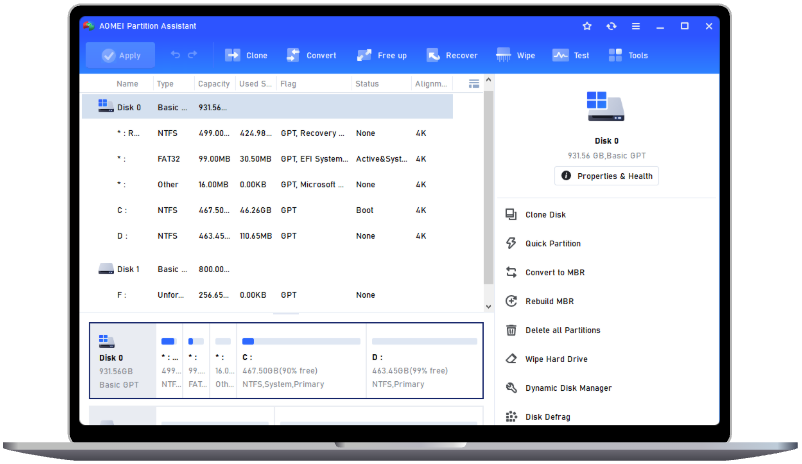Hard Disk Speed Checker: Diagnose and Improve Storage Performance
In today’s fast-paced digital world, maintaining optimal storage performance is essential for both personal and professional computing. This guide introduces you to three reliable hard disk speed checker tools, explains how to use them effectively. Whether you’re troubleshooting slowdowns or optimizing your system, this resource will help you unlock your storage’s full potential.
Understanding Hard Disk Speed
What does hard disk speed means and why does it matter? Hard disk speed refers to how quickly your storage device can read and write data. This is measured in megabytes per second (MB/s) or gigabytes per second (GB/s).
👉 Read Speed: How fast data can be retrieved from the disk.
👉 Write Speed: How fast data can be saved to the disk.
👉 RPM (Revolutions Per Minute): For traditional HDDs, higher RPM means faster performance.
👉 Latency: The delay between a request and the data being accessed.
Slow hard disk speeds can lead to frustrating performance issues, such as delayed file access, slow application launches, and overall system lag.
3 Hard Disk Speed Checker Tools
Hard disk speed checker tools are essential when evaluating disk speed. By using a reliable hard disk speed checker, you can diagnose performance issues and take actionable steps to improve your storage efficiency.
Here are three recommended methods to check your hard disk speed, ranging from user-friendly software to built-in system tools. Whether you use SSDs or HDDs, these tools can help you effortlessly diagnose issues and optimize system performance.
Option 1. AOMEI Partition Assistant Standard
One of the most recommended hard disk speed checker tools is AOMEI Partition Assistant. This versatile software includes a robust disk speed test feature that works seamlessly with both internal and external drives on Windows 11, 10, 8/8.1, and 7. With its user-friendly interface and detailed performance analysis, AOMEI Partition Assistant helps you identify potential issues on your hard drive and optimize its performance with ease.
Here’s how to check hard disk speed using AOMEI Partition Assistant Standard:
Step 1. Download and install AOMEI Partition Assistant Standard.
Step 2. Launch this tool, select the disk you wish to test, and click Disk Speed Test under the Test menu.
Step 3. All partitions will be listed here and you can choose the one you want to test and click Start to start the process.
Step 4. Once the process is complete, export the results for a deep analysis.
Alternatively, click the Pro Mode to check more information, including test mode, block size, queues, and read/write speed.
Option 2. Task Manager
In addition to third-party software, you can use Task Manager in Windows. While it’s commonly used to monitor running processes and applications, it also offers a quick and easy way to check hard disk speed.
Here’s how to check the speed of hard disk using Task Manager:
Step 1. Type “Task Manager” in the search bar and open it.
Step 2. Click on the “Performance” tab and select your hard disk from the list on the left.
Step 3. Then you can see some basic data about that disk, including read and write speed. If the active time is consistently high (90% or more), your hard disk may be struggling to keep up with demands.
Option 3. Command Prompt
For advanced users, the Command Prompt offers a command-line method to check hard disk speed. It allows you to run a disk performance test using simple commands, providing detailed insights into your hard disk’s read and write speeds.
Here’s how to check hard disk speed via Command Prompt:
Step 1. Press Win + R, type cmd, and press Enter.
Step 2. Enter "winsat disk -drive [drive letter]", and press Enter again.
Step 3. Then, the Command Prompt will list the drives and their current speed.
Pro Tips to Improve Performance of Slow Hard Disks
If your HDD or SSD is performing significantly below expected speeds, it may be a sign of aging or failure. Here are several practical tips you can take:
💡 Free Up Disk Space: Remove unnecessary files, uninstall unused programs, and clear caches to improve performance.
💡 Defragment Hard Disks (HDDs Only): Defragmentation organizes fragmented data, making it easier for your hard disk to access files quickly.
💡 Enable TRIM (SSDs Only): Ensure SSD TRIM is enabled to maintain optimal performance and longevity.
💡 Check for Malware: Run a thorough antivirus scan to rule out malware that could be slowing down your system.
Conclusion
Regularly monitoring your hard disk speed is a critical step in maintaining a fast and efficient system. By using reliable hard disk speed checkers like AOMEI Partition Assistant, you can easily check the speed of your hard disk and identify performance issues.
If your hard drive is consistently slow, despite efforts to defragment, optimize, and clean it, consider replacing it with a new one. It is always a good idea to back up data before proceeding.
FAQs
Q1: What is a good hard disk speed?
A: Typically, SSDs are much faster than HDDs. For HDDs, a read/write speed of 80-160 MB/s is considered good. For SSDs, speeds of 200-550 MB/s or higher are typical.
Q2: How often should I check my hard disk speed?
A: It’s a good idea to check your hard disk speed every few months or whenever you notice performance issues.
Q3: Does a hard disk speed checker work for external drives?
A: Yes, most hard disk speed checker tools AOMEI Partition Assistant Standard can test both internal and external drives.


